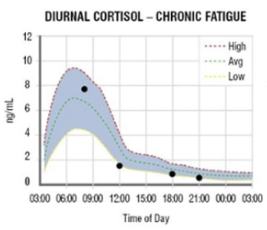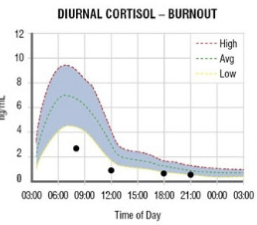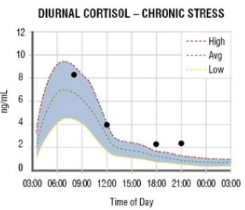Cortisol is one of our bodies hormones that regulates metabolism, blood sugar, blood pressure, hunger cravings, digestion, sleep and wake patterns, physical activity, immune response and response to stress
Normal cortisol levels are highest in the mornings and slowly lessen towards the end of the day
(The green line signifies a normal cortisol wave, with the black dots indicative of when cortisol is checked in a salivary cortisol test)
When cortisol is not balanced, it can have 3 unique trends:
Chronic Fatigue
Symptoms include mid-day energy drop, drowsiness and poor exercise recovery
Burnout
Symptoms include day-long fatigue, irritability, food cravings, insomnia and exhaustion
Chronic Stress
Symptoms include feeling “tired but wired,” food cravings, insomnia and anxiety
Where does this mighty hormone come from?
Let’s start with the hypothamalmus.
The hypothalamus is a gland located at base of the brain, near the pituitary gland. It plays a crucial role in functions such as releasing hormones and regulating body temperature.
Next is the pituitary gland.
Small, yet mighty (about the size of a pea) it is found at the base of the brain and otherwise known as the “master gland.” It produces many hormones, directs certain processes and stimulates other glands to produce hormones.
And lastly the adrenal glands.
These are 2 small glands located on top of each kidney. They produce hormones that we cannot live without such as sex hormones and cortisol.
When this feedback loop (HPA Axis) is working optimally, it will readily produce these hormones that we need. It will release a lot of cortisol in the morning and low levels in evenings to allow for sleep. However, when various lifestyle factors come into play that disrupt this loop, then these hormones are not produced in their optimal volume nor capacity.
This is otherwise known as HPA Axis Dysfunction
Sometimes referred to as “adrenal fatigue,” HPA Axis Dysfunction looks like this:
1. When much more cortisol is released
2. Adrenals are no longer responding to the hormone ACTH (a hormone that stimulates the adrenals to produce cortisol)
3. Cortisol keeps getting released, but it’s broken down too quickly because the body is working so hard to keep up. This can lead to one of the following:
Cortisol remains high all the time
Cortisol is low in the morning and high at night
4. This communication breakdown causes primary functions like digestion, reproduction, growth, and rest to shut down
Stress to some capacity or degree is needed. However nowadays, we are responding to nearly everything with the same degree of stress as we would to greater events. The way we respond to a car coming toward us should not be the same way we respond to an email from an upset manager.
Here is where chronic stress can negatively impact our health:
It greatly affects the physiology of the brain
Stress reduces gray matter volume in key areas of the prefrontal cortex and limbic regions - the areas involved in emotional stability, impulse control and reward regulation
It alters the way neural stem cells develop in the hippocampus - the region associated with memory and learning
It stresses the immune system
This makes you more vulnerable to getting sick and having flare ups
It disrupts your gut microbiome
This can increase your vulnerability to mood disorders, IBS, obesity and type 2 diabetes
So, what do we do about managing and balancing cortisol? Here are some tips:
Get sunlight exposure first thing in the morning, before looking at your phone or other screens. If you live somewhere that doesn’t get sunlight in the morning, I love lamps such as Gembared
Start your day slow, with practices that do not stress nor overwhelm you. Meditation, journaling, a walk, reading, physical activity, breathwork or making a cup of tea or coffee
Have a breakfast that is well balanced with healthy fats, protein and complex carbohydrates
Write out your goals and to do’s for the day, before looking at emails or starting your work day
Keep yourself hydrated, get up from your desk every 30 minutes and walk around the office/your home/outside (bonus points for going outside and getting more sunlight exposure!)
Realize that multi tasking is not ideal. The human species is actually not fit to multi task, so prioritize your tasks accordingly and work in that order one by one
Be sure to eat a well balanced lunch and ideally not in front of a screen (checking emails while eating only cranks up cortisol even more, when during this time your cortisol should slowly be tapering down)
End your work day with another form of relaxation, to bookend your day. Go for a walk (watching the sunset is another bonus point), practice restorative yoga, make dinner mindfully and without distraction, call a friend and chat
As the sun begins to set, if Netflix is your nighttime must, wear blue light blocking glasses or download an app like Fluxe onto your computer. Blue light exposure greatly affects your cortisol and melatonin production (they go hand in hand)
Do your best to be away from all screens 30 minutes before bed. Use that time instead to get ready for bed (my skin and oral care routine alone takes 15 minutes), do a word search or read a book (your eyes scanning back and forth across a page actually helps you fall asleep easier)





